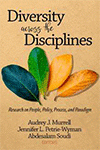
Diversity Across the Disciplines
Research on People, Policy, Process, and Paradigm
Edited by:
Audrey J. Murrell, University of Pittsburgh
Jennifer L. Petrie-Wyman, University of Pittsburgh
Abdesalam Soudi, University of Pittsburgh
Published 2019
Diversity research and scholarship has evolved over the past several decades and is now reaching a critical juncture. While the scholarship on diversity and inclusion has advanced within various disciplines and subdisciplines, there have been limited conversations and collaborations across distinct areas of research. Theories, paradigms, research models and methodologies have evolved but continue to remain locked within specific area, disciplines, or theoretical canons. This collaborative edited volume examines diversity across disciplines in higher education.
Our book brings together contributions from the arts, sciences, and professional fields. In order to advance diversity and inclusion across campuses, multiple disciplinary perspectives need to be acknowledged and considered broadly. The current higher education climate necessitates multicultural and interdisciplinary collaboration. Global partnerships and technological advances require faculty, administrators, and graduate students to reach beyond their disciplinary focus to achieve successful programs and research projects. We need to become more familiar discussing diversity across disciplines.
Our book investigates diversity across disciplines with attention to people, process, policies, and paradigms. The four thematic categories of people, process, policies, and paradigms describe the multidisciplinary nature of diversity and topics relevant to faculty, administrators, and students in higher education. The framework provides a structure to understand the ways in which people are impacted by diversity and the complicated process of engaging with diversity in a variety of contexts. Policies draw attention to the dynamic nature of diversity across disciplines and paradigms presents models of diversity in research and education.
CONTENTS
Preface: Diversity Across the Disciplines: Research on People, Policy, Process, and Paradigm, Patricia Beeson. PART I: PEOPLE. Beliefs About Competence: The Story of Self-Efficacy, Gender, and Physics, Z. Yasemin Kalender, Emily Marshman, Timothy Nokes-Malach, Christian Schunn, and Chandralekha Singh. Realist Review: Promoting Diverse Stakeholder Engagement, Katherine W. Bogen, Lisa D. Brush, Samantha Ciaravino, Maria Catrina D. Jaime, Heather L. McCauley, and Elizabeth Miller. Taking Refuge/ Syria: A Case Study for Interdisciplinary Collaboration, Cynthia Croot. Researching Ourselves: Naikan Meditation and Making Diversity Work, Clark Chilson. Using Picture Books to Promote Young Children’s Understanding of Gender Diversity and Gender Equity, Katrina Bartow Jacobs and Thomas Hill. PART II: PROCESS. Relationships, Resources, and Reciprocity: Lessons on Engaging With Marginalized and Diverse Communities Through Asset-Based Participant Evaluation Research, Lori Delale-O’Connor and Ira E. Murray. Exploring Themes of Culture in a Medical School Cultural Competence Course, Abdesalam Soudi, Leyan deBorja, and Jeannette E. South-Paul. Intergroup Dialogue: Transformation From the Inside Out, Mario C. Browne and Erika Gold Kestenberg. Cultural and Linguistic Diversity: A Multifaceted Approach, Shelome Gooden, Abdesalam Soudi, Karen Park, and Valerie Kinloch. Diversity in the Classroom: Microaggressions and Their Impact, Nisha Nair and Deborah C. Good. PART III: POLICIES. Comparative Political Science Research on Diversity, Scott Morgenstern and Kelly Morrison. Using Diversity Research to Change Social Policy: The Case of Racial Discrimination in Local Government Contracting, Ralph Bangs and Audrey J. Murrell. Cross-Disciplinary Effects of Urbanization in Africa: The Case of Family, Culture, and Health in Ghana, Jennifer L. Petrie-Wyman. From Disruptive to Frugal Innovation: Meeting the Personalized Healthcare Needs of Diverse Patient Populations, Rose E. Constantino and Margarete L. Zalon. The Intersection of Diversity and Business Ethics Research: Examining the Special Case of Predatory Affinity Fraud, Ray Jones, Jennifer L. Petrie-Wyman, and Audrey J. Murrell. PART IV: PARADIGMS. Encountering Diversity Through Community-Engaged Scholarship, Lina Dee Dostilio. The Critical Demography Paradigm: Informing Instructional Strategies on Diversity and Inclusion in Higher Education, Geoffrey L. Wood. Integrating Diversity and Ethics Into Palliative Care for African Americans, John C. Welch. Enhancing Diversity Within Academic Health Centers: Moving From Obstacles to Opportunities, Jeannette E. South-Paul, Kendall M. Campbell, and Audrey J. Murrell. Deliberative Community Forums as Inclusive Public Work: Collaborations That Engage Difference as a Resource, Tim Dawson. Epilogue: The Evolving Paradigm of Diversity and Inclusion: Where Are We Headed? James E. Taylor. About the Editors. About the Contributors.
-
Paperback978-1-64113-919-9
Web price: $45.04 (Reg. 52.99)
-
Hardcover978-1-64113-920-5
Web price: $80.74 (Reg. 94.99)
- eBook978-1-64113-921-2

- EDU048000 - EDUCATION: Inclusive Education
- EDU015000 - EDUCATION: Higher
- EDU037000 - EDUCATION: Research
-
 (Re)Envisioning Social Studies Education Research
Current Epistemological and Methodological Expansions, Deconstructions, and Creations
(Re)Envisioning Social Studies Education Research
Current Epistemological and Methodological Expansions, Deconstructions, and Creations
-
 Affirming Identity, Advancing Belonging, and Amplifying Voice in Sororities and Fraternities
Affirming Identity, Advancing Belonging, and Amplifying Voice in Sororities and Fraternities
-
 Expanding the Vision of Faculty Learning Communities in Higher Education
Emerging Opportunities for Faculty to Engage Each Other in Learning, Teaching, and Support
Expanding the Vision of Faculty Learning Communities in Higher Education
Emerging Opportunities for Faculty to Engage Each Other in Learning, Teaching, and Support
-
 Faculty Learning Communities
Working Towards a More Equitable, Just, and Antiracist Future in Higher Education
Faculty Learning Communities
Working Towards a More Equitable, Just, and Antiracist Future in Higher Education
-
 Institutional Diversity in American Postsecondary Education
Institutional Diversity in American Postsecondary Education
-
 Promoting Equitable Classroom Practices in Higher Education
Approaches Beyond Curriculum
Promoting Equitable Classroom Practices in Higher Education
Approaches Beyond Curriculum
-
 The Handbook for Aspiring Higher Education Leaders
The Handbook for Aspiring Higher Education Leaders

